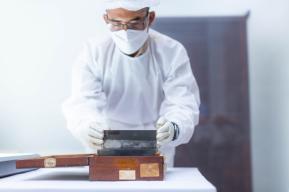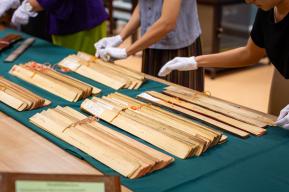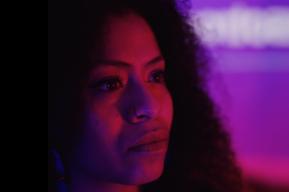Amidst this backdrop, a new generation of the AlUla community have embraced its storied documentary heritage as a knowledge asset and breathing life into AlUla’s ancient legacy.
In the bustling market district neighbouring the Old Town, hundreds of ancient homes are being restored as part of a comprehensive regeneration project led by the Royal Commission for AlUla (RCU). Ms. Abdullah is one of 18 female Saudi Arabian store owners in this district. With women accounting for 25 percent of owners, she is part of a growing number of women from the community engaging with the region’s heritage through innovation and creativity. A local artist and calligraphist, she has made it her mission to capture the essence of AlUla’s history through skilfully crafted stone pieces.
With her family’s farm nestled among rocks engraved with ancient scripts, she “grew up captivated by the intricate design and meaning of rock inscriptions” that surrounded her. Enrolling in courses led by archaeologists, she says “I wanted to learn about the civilizations that once inhabited my land and decode the mysteries they left behind.”
For Abdullah, heritage is not merely a relic of the past but a living, breathing testament to the community’s aspirations for the future. Through her art, she seeks to recreate and reimage AlUla’s inscriptions that dot the landscape. Blending the native rock and sand elements, Abdullah inscribes calligraphic writing into stone pieces in a manner that “echoes my heritage” and “connects to the ancient stories engraved in the rocks.”
But Abdullah's work extends beyond the realm of arts and crafts; Recognizing the importance of making AlUla's heritage accessible to all, she has created hand-held guides that bridge the gap between modern alphabets to the ancient scripts, allowing a new generation to connect with their roots in a meaningful way. Once a crossroads of cultural exchange, AlUla in the present day is becoming a hub for enthusiasts of its history.
As AlUla's documentary heritage gains global recognition, its wider preservation and access are being facilitated as part of a UNESCO Memory of the World (MoW) Programme project.
Jabal Ikmah, which contains approximately 300 inscriptions dating to the Dadanite and Nabataean civilizations during the second half of the first millennium BCE, was listed on the MoW International Register in 2023. An open library of written heritage, its inscriptions highlight lesser-known dynamics within the Arabian Peninsula’s history, depicting women as owners of property, agricultural land holders and as participants in rituals within Dadanite society.
Memory of the World
The Memory of the World (MoW) Programme is a UNESCO initiative to safeguard the world’s documentary heritage and audiovisual heritage against collective amnesia. By facilitating preservation and access to the records of our history, the MoW Programme seeks to hone intercultural understanding and appreciation of our shared humanity.













